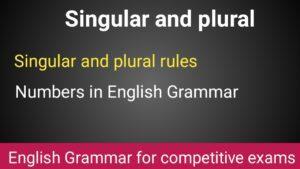
Singular and plural in English grammar. Singular and plural number in English grammar. Numbers in English grammar.
English grammar for competitive exams especially for GPSTR and CET exam. We also learn singular and plural rules.
To get more video notes for English grammar visit our YouTube channel. This channel is very useful for all competitive exam preparation.
singular and plural in English:
Singular is one, and Plural is more than one. Such nouns are called countable nouns. But the other kind of noun which has no plural form is called an uncountable noun.
Nouns can typically be divided into two categories:
1. Countable nouns and
2. Uncountable nouns.
- Nouns that are countable (e.g. “one house,” “two houses” or “one deer,” “two deer” are called “countable nouns.”
- The plural forms of these nouns are usually made by adding an s, – es, – ies and – ves to the singular forms.
Example:
| Singular | Plural | Singular | Plural |
| wolf | wolves | boy | boys |
| train | trains | cry | cries |
| class | classes | egg | eggs |
| horse | horses | knife | knives |
| wife | wives | mouse | mice |
However, some countable nouns have irregular plural forms:
| Singular | Plural |
| sheep | sheep |
| tooth | teeth |
| fish | fish |
| man | men |
| person | people |
Uncountable nouns are things which cannot be counted by themselves because they are always treated as a group, volume, mass or quantity. Some common mass nouns are:
| materials | coal, steel, wood |
| food | bread, fruit, butter |
| ideas | love, knowledge, advice |
| Liquids | water, oil, gasoline |
In order to count mass nouns, you must use “amount words.” Some examples are: a pound of bread, three baskets of fruit, four slices of bread, two litres of oil, a glass of water, a grain of sand, two pairs of eyeglasses.
During the collection of energy, one of the witches made a mistake in uttering the words.
In the sentence above, four nouns are underlined. ‘Energy’ is an uncountable noun; witches, mistake and words are countable nouns.
During famine rice, sugar and food became unaffordable
Uncountable nouns are used in the sentence above.Countable nouns are formed in different ways. The table below gives a few examples.
singular and plural rules:
| by adding ‘s’ | by adding ‘es’ | ||
| Singular | Plural | Singular | Plural |
| snake | snakes | witch | witches |
| fruit | fruits | box | boxes |
| vegetable | vegetables | hero | heroes |
| friend | friends | potato | potatoes |
| pizza | pizzas | bus | buses |
| burger | burgers | gas | gases |
| dog | dogs | mango | mangoes |
Plurals are formed when the word changes with:
| – ves | – ies |
| wolf ─ wolves | family ─ families |
| leaf ─ leaves | baby ─ babies |
| shelf ─ shelves | country ─ countries |
| self ─ selves | Lady – ladies |
| Knife – knives | City – cities |
| Life – lives | Study – studies |
| Wife – wives | Sky – skies |
| Beef – beeves | Hobby – hobbies |
Some words have irregular plurals
| Singular | Plural |
| child | children |
| man | men |
| foot | feet |
| mouse | mice |
| woman | women |
| deer | deer |
Watch this video for the explanation of numbers in English grammar.